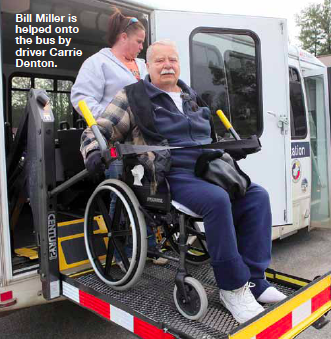
If you haven’t seen the blue and white mini-buses and vans out and about, crisscrossing St. Clair County, chances are you haven’t been out and about.
St. Clair County Public Transportation’s growing fleet has been logging thousands of miles en route to filling a significantly sizable void in getting citizens from Point A to Point B and back again on a daily basis.
From a dispatch center in a tiny office in the Pell City courthouse, huge needs are being met, according to Director Terry Rowe. He underscores the notion with simple facts: In 2009 when the system was put into operation, the first quarter passenger trips numbered 124. This past quarter? Up that to 8,740 and climbing.
For years, officials struggled with how to address its public transportation needs. But it wasn’t until 2009 that the county commission, in a move initiated by Chairman Stan Batemon, seized the opportunity to create a viable transportation system.
Greatly helped by federal stimulus money, the fledgling system was able to add six new buses to its fleet of two, and made enough off minimal fares to buy a seventh. Now, the system is waiting on its 10th vehicle to be pressed into service in hopes of expanding to meet the burgeoning needs of a growing county.
“We have increased service more than 600 percent,” Rowe said. “That’s tremendous to see.”
The county is divided into zones of six square miles, with a one way trip costing the rider a mere $2. That was welcome news to people like Betty Hughes of Moody, Stephen Harrington of Odenville and Bill Miller, also of Odenville.
Their thrice weekly trips for dialysis treatments cost them anywhere from $65 to $100 a week. “It means everything to me,” said Miller. It was costing him $400 a month to get to life saving treatments. “You can buy a car with that.” From his wheelchair, he displayed a big smile as one of the drivers assisted him to the bus waiting outside a Pell City dialysis center. “The drivers are always on time. They help me with my bags. They’re just Good Samaritans.”
For Hughes, it means the ability for her husband to work. The couple only has one car, and when she needed to go to dialysis, those $65 a week trips mounted. “You can see that need,” she said. “It’s very important to me.”
Harrington echoed his fellow passengers’ views. “It has helped me quite a bit.” Traveling to dialysis three days a week at $80 was a steep price to pay, but he couldn’t afford to forego the treatments. “They saved me quite a bit of money.”
Dialysis patients aren’t the only beneficiaries of this system. Passengers climb aboard to go to the store, to appointments, to the beauty shop, to and from work. “We take anybody at any age anywhere they need to go,” Rowe said. “They don’t have to make excuses or give a reason. We take them where they want to go.”
Funded 50 percent from county coffers, the new system is actually saving money. Prior to the new system being put into place, it cost the county more than $60,000 a year to operate it. Now, it costs less than $20,000.
“We are here working for the citizens of the county,” Rowe noted. “It’s their system, and it’s totally for their benefit. They can see their tax dollars literally coming right to their home providing services they need.”
Calling it “such a benefit,” Rowe talked of the enthusiasm he and the staff see on a daily basis. “Their enthusiasm pumps us up. We think we’re doing something worthwhile. It gives helpless people the feeling of independence. They say, ‘I can take care of myself now.’ It‘s the most rewarding thing I‘ve ever done.” The staff “really cares. They work from the heart,” he said.
Moody’s Clyde Rice, who has been a driver for nearly two years, would have to agree. Retired from the government, he said, “This is the greatest job I’ve ever had. It is so rewarding to help people. Two years ago, the program was so small he only drove once every two or three months. “Now, I’m driving just about every day. Directly helping people, it’s very rewarding and something I love doing.”
The reward for passengers is just a phone call away, Rowe said. Dial dispatch at 338-1352, “and if it can be make to happen, we’ll make it happen.”



